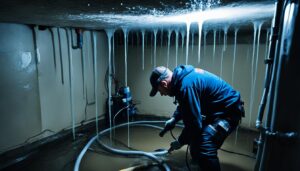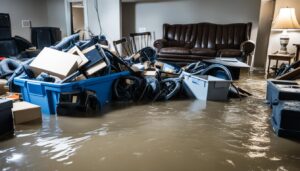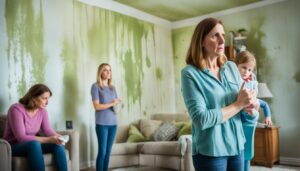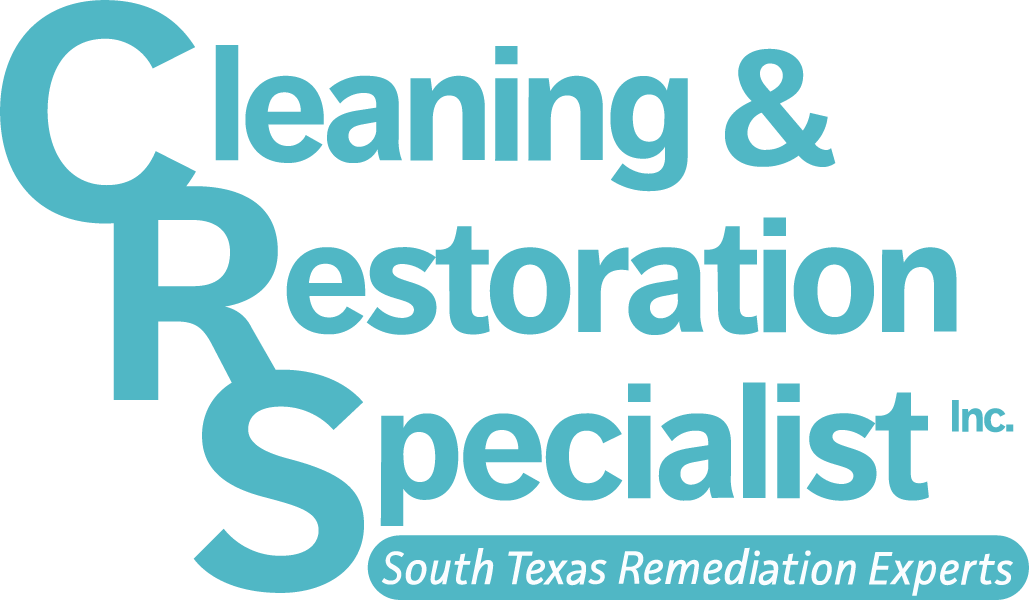If you’re living in a house with water damage, you might be wondering whether it’s safe to sleep in it. Water damage can cause severe structural and health hazards, particularly if it is left unaddressed for prolonged periods. Understanding the risks and potential health consequences is crucial so that you can make informed decisions about your safety and well-being.
In this article, we will delve into the dangers of water damage and what it means for your everyday life. We will also explore what you can do to stay safe if you find yourself in a water-damaged home.
To paint a clearer picture, let’s first take a closer look at what water damage is and how it can impact your daily life.
Key Takeaways:
- Water damage poses severe risks and hazards, especially if left untreated
- Health complications can arise from prolonged exposure to water-damaged environments, affecting the respiratory system and causing allergies or asthma exacerbation
- Assessing the extent of water damage is crucial to understanding how much it can affect your home and health
- Precautions can minimize the risks involved with sleeping in a water-damaged home temporarily
- Hiring water damage remediation experts is the best route to reducing potential risks and ensuring a safe living environment
Understanding the Dangers of Water Damage
Water damage may seem like a minor inconvenience, but it can pose a range of hazards to your health and home. Here are several dangers to keep in mind:
| Water Damage Dangers | Description |
|---|---|
| Structural Issues | Water damage can weaken foundations, walls, and ceilings, increasing the risk of collapse or compromising the structural integrity of your home. |
| Mold Growth | Moisture from water damage can trigger mold and mildew growth, leading to a variety of health issues such as respiratory problems, allergies, and skin irritations. |
| Compromised Air Quality | As moisture continues to seep into your walls, floors, and ceilings, it can impact the air quality in your home and potentially cause health complications. |
Understanding the potential risks associated with water damage is critical in determining the safety of sleeping in a water-damaged home.
Health Effects of Sleeping in a Water-Damaged Home
When you sleep in a water-damaged house, you expose yourself to health risks that could impact your overall well-being. Exposure to damp and moldy environments may lead to respiratory problems such as coughing, wheezing, and shortness of breath. Additionally, being in contact with mold spores could trigger allergic reactions in susceptible individuals and exacerbate existing conditions like asthma.
Moreover, prolonged exposure to mold and dampness may increase the risk of developing various health complications, including respiratory infections, chronic sinusitis, and other systemic allergic diseases. Sleeping in such an environment could also compromise your immune system, leaving you more susceptible to illnesses and infections.
To reduce your risk of health complications, consider seeking alternative accommodation until the water damage is fully remedied. If temporary stay is unavoidable, take precautions such as wearing personal protective gear like masks and gloves, opening windows for ventilation, and maintaining cleanliness to reduce mold buildup.
Assessing the Extent of Water Damage
Determining the severity of water damage is crucial in evaluating the potential risks it poses. To thoroughly examine the extent of the damage in your home, you must inspect all areas that were affected by water, including floors, ceilings, walls, and the foundation. Look for any signs of discoloration, mold growth, water stains, or damage to the structural components of your home. If you notice any of these issues, it is a sign that you need to take additional precautions before sleeping in your home.
You can use a moisture meter to gauge the extent of water damage. It detects moisture levels in various areas, helping you identify hidden damage that might not be visible to the naked eye. It is also essential to check the air quality in your home since water damage can increase the risk of mold growth and lead to poor air quality, which can cause respiratory issues. Consider hiring a professional to evaluate the extent of water damage and determine the best course of action for remediation and ensuring a safe living environment.
Note: The above image is for illustrative purposes only and may not reflect the specific extent of water damage in your home.
Taking Precautions for Sleeping in a Water-Damaged Home
When sleeping in a water-damaged home, taking necessary precautions can help minimize the risks to your health and safety. Here are some safety measures you should consider:
- Use protective gear: Wear gloves, goggles, and respirators while cleaning up water-damaged areas. This can help prevent exposure to harmful chemicals and mold spores.
- Improve ventilation: Open windows or use fans to improve air circulation. This can help reduce moisture and prevent mold growth.
- Maintain cleanliness: Regularly clean and disinfect all water-damaged surfaces to prevent bacteria and mold buildup. Use a solution of one cup of bleach per gallon of water to disinfect surfaces.
By following these precautions, you can minimize the risks associated with sleeping in a water-damaged home and ensure a safer living environment.
Seeking Professional Help for Water Damage Remediation
If you’re dealing with water damage in your home, seeking professional help for water damage remediation is crucial. While DIY may seem like a cost-effective solution, professional expertise can ensure complete and efficient restoration. Professional water damage remediation experts have the necessary tools, equipment, and experience to address the root cause of the damage and mitigate potential risks.
Professional water damage remediation companies follow industry-standard practices and use advanced techniques to restore your home to its pre-damage condition. They begin with a thorough assessment of the damage to determine the extent of the problem and create a remediation plan tailored to your property’s unique needs.
Whether it’s addressing the source of the problem, removing excess water, or drying a damp environment, professional experts can ensure that the remediation process is completed promptly and efficiently, minimizing the risks of potential health hazards. Hiring experts for professional water damage remediation guarantees peace of mind, knowing that your home is safe and free of hazards related to water damage.
Don’t leave your safety and well-being to chance. Seek professional help for water damage remediation and ensure a safe living environment for you and your loved ones.
Conclusion
After considering the potential dangers and health effects of sleeping in a water-damaged home, it’s understandable to feel concerned about your safety. However, by assessing the extent of the water damage and taking necessary precautions, you can minimize the risks involved.
While there are temporary solutions you can implement, it’s important to seek professional help for water damage remediation to ensure a safe living environment. By doing so, you can avoid potential health complications and structural issues caused by water damage.
Remember, your safety should always come first. Don’t hesitate to prioritize your well-being and seek professional help when needed.
FAQ
Is it safe to sleep in a water-damaged home?
Sleeping in a water-damaged home can pose risks to your health and safety. It is important to understand the potential dangers and take appropriate precautions.
What are the dangers of water damage?
Water damage can lead to structural issues, mold growth, and compromised air quality, which can pose health risks and affect the safety of your home.
What health effects can occur from sleeping in a water-damaged home?
Prolonged exposure to a water-damaged environment during sleep can lead to respiratory problems, allergies, asthma exacerbation, and other potential health complications.
How can I assess the extent of water damage in my home?
Evaluating and assessing the extent of water damage requires a thorough examination of affected areas, including checking for visible signs of damage, moisture, and potential structural weaknesses.
What precautions can I take when sleeping in a water-damaged home?
To minimize risks, it is recommended to use proper protective gear, improve ventilation, maintain cleanliness, and consider using dehumidifiers and air purifiers to reduce moisture and improve air quality.
Why is it important to seek professional help for water damage remediation?
Professional water damage remediation experts have the necessary expertise and equipment to address the underlying issues, ensuring thorough cleanup, drying, and restoration of your home to create a safe living environment.









